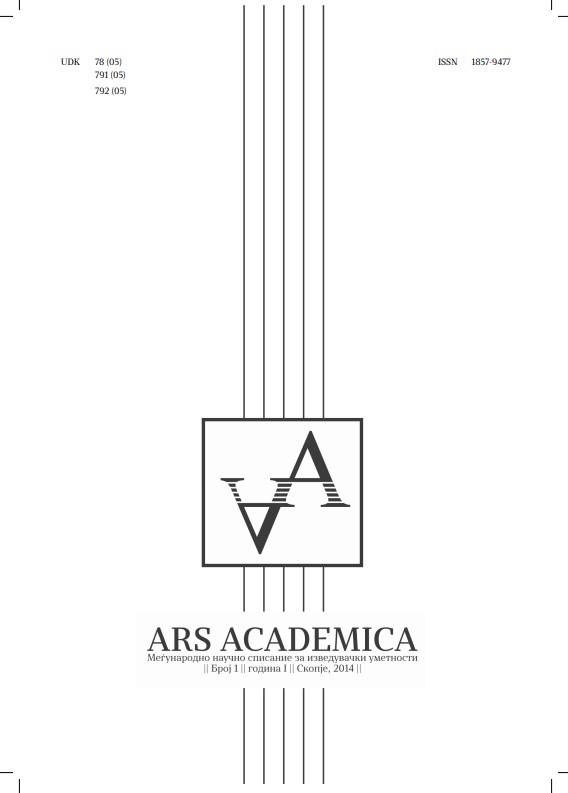Journals
-
Аrs Academica
Научно-истражувачко списание за изведувачки уметности, единствено во оваа сфера во нашата земја. Неговата интердисциплинарна поставеност и третман на теми од областа на актерската игра, режијата, музикологијата, филмот, етномузикологијата, танцовата теорија, продукцијата, но и пeдагогијата, психологијата, историјата на уметноста итн., го зголемува читателскиот аудиториум и дава проширен опфат на темите кои се обработуваат.
Поле: перформативни уметности
-
PEDAGOGICAL MAGAZINE Science magazine for education issues
Списанието обезбедува простор за претставување на најновите сознанија што се однесуваат на образовните прашања во најширока смисла.Следејќи го концептот на интегрален пристап во образовните процеси од една страна, списанието овозможува публикација на научни истражувања, студии на случај, компаративна анализа на теории, образовани системи и образовни политики, како и интердисциплинарни истражувања кои во својата основа ги имаат образовните процеси. Оттука и придонесот на трудовите за унапредување на воспитно-образовната теорија и практика како поле на дејствување.
-
Annual of the Blazhe Koneski Faculty of Philology
Annual of Blazhe Koneski Faculty of Philology in Skopje is a scientific journal published by the Ss Cyril and Methodius University in Skopje, Blazhe Koneski Faculty of Philology since 1975. The journal publishes one issue per year with articles from the fields of literature and culture, language and teaching, translation and interpreting, as well as reports of activities of the faculty.
-
Religious dialogue and cooperation
The Journal Religious Dialogue and Cooperation is published by the Centrе for Intercultural Studies and Research at the Faculty of Philosophy at the Ss. Cyril and Methodius University in Skopje, which is conceived as an international scientific journal for all areas of religion. The journal publishes original scientific papers (statements from original empirical research on religion) and reviewed scientific papers (systematic reviews, analyses, processes, and interpretations of research findings and theoretical knowledge from a particular area of religion).
-
Iustinianus Primus Law Review
Iustinianus Primus Law Review is an international, peer-reviewed, open-access, online, scientific law journal published by the Faculty of Law “Iustinianus Primus” at Ss. Cyril and Methodius University in Skopje, Republic of North Macedonia. Its first volume was published in 2010.
Iustinianus Primus Law Review is an open access journal, and all content is freely available without charge to the user or his/her institution. Users are allowed to read, download, copy, distribute, print, search, or link to the full texts of the articles, or use them for any other lawful purpose, without asking prior permission from the publisher or the author.
ISSN 1857-8683
Iustinianus Primus Law Review is publish only in electronic format.
Iustinianus Primus Law Journal is indexed in HEINONLINE, EBSCO and Directory of Open Access Journals - DOAJ.
-
Slavic Studies
Slavic Studies is an international Slavic journal in the field of humanities published by the Department of Slavic Studies at the Blaže Koneski Faculty of Philology, at the Ss. Cyril and Methodius University in Skopje.
-
International Journal for Education, Research and Trainning
International Journal for Education, Research and Training is an international peer-reviewed scientific journal published by the Faculty of Philosophy, Ss. Cyril and Methodius University in Skopje. It aims to contribute to the development of academic and professional debates in the field of education and training at local, national, regional, and international levels.
The Journal encompasses topics related to educational theory and practice, teaching and learning processes, curriculum development, assessment and evaluation, teacher education and professional development, vocational education and training, lifelong learning, educational management and leadership, digital education, inclusive education, and interdisciplinary research in education.
-
Psychology: Science and Practice
Списанието „Психологија: наука и практика“ е меѓународно научно-стручно списание за сите гранки на психологијата, во кое се објавуваат изворни научни трудови (соопштенија од оригинални емпириски истражувања), прегледни научни трудови (систематски прегледи, анализи, процени или толкувања на истражувачки наоди и теоретски сознанија од одделна област) и различни видови стручни прилози (соопштенија од конференции, извештаи од реализирани проекти, пленарни предавања, прикази, коментари, критички анализи, осврти и интервјуа).
Списанието го издава Институтот за психологија при Филозофскиот факултет на Универзитетот „Св. Кирил и Методиј“ во Скопје, Северна Македонија.
“Psychology: Science and Practice” is a peer-reviewed international journal that publishes research papers (reports from original empirical studies), review papers (systematic reviews, analyses, evaluations and interpretations of research results and theoretical insights from a specific field) and contributions (book reviews, critical analyses, brief reports from conferences and projects, commentaries and interviews).
The journal is published by the Institute of Psychology, Faculty of Philosophy at the Ss Cyril and Methodius University in Skopje, North Macedonia. -
Security Dialogues
The Journal Security Dialogues (SD) is particularly interested in papers that link domestic and international political issues and developments with national and regional security concerns and implications. Security is understood both in its traditional (e.g., interstate wars and conflict, weapons proliferation, military modernization, alliance building, defence and foreign policy, arms control, etc.) and non-traditional (e.g., weak states, civil wars, insurgency movements, ethnic violence, economic crisis, social conflicts, democratic change, transnational terrorism, piracy, human security, etc.) senses.
-
Ревија за социјална политика/Journal of Social Policy
Ревија за социјална политика/Journal of Social Policy is international peer-reviewed scientific journal published by the Faculty of Philosophy, Ss. Cyril and Methodius University in Skopje. It aims to contribute towards raising critical public and academic debates on social policy issues, relevant at the local, national, regional, and international level. The Journal encompasses topics related to the labor market, living standards, social protection, social insurance, education, health, housing, family policy, social assistance, social transfers, poverty and social exclusion, anti-discrimination, etc.
-
Annual of the Faculty of Philosophy in Skopje
The Annual of the Faculty of Philosophy in Skopje is an international peer-reviewed journal, published by the Faculty of Philosophy at the Sts. Cyril and Methodius University in Skopje.The journal publishes one issue per year and is one of the oldest national scientific publications, published since 1948. It publishes original and review scientific papers, expert contributions, presentations at conferences and books, summaries of doctor's dissertations, commemorations of significant anniversaries, etc.
-
Economy, Business and Development: An International Journal
Economy, Business & Development (EB&D) journal seeks to promote an understanding of the phenomena of development from a combined business and economy perspective. The journal consciously endeavours to combine scholarly perspectives relevant to academic research and policy issues relating to development. In this connection, we use the term development broadly - to include scholarship drawing on business and economic perspective in the context of developed and developing countries on a micro or macro level. We are also accepting research articles that focuses on one country, but provide a generalisation that can be used in similar empirical context. We welcome in-depth studies that are used to validate or extend existing theories and models.
-
Journal of Contemporary Economic and Business Issues (Archived)
IMPORTANT NOTE
Journal of Contemporary Economic and Business Issues (JCEBI) does not accept manuscripts anymore. JCEBI from June 2020 continues under a new name "Economy, Business and Development: An International Journal". The web site of the new journal is https://journals.ukim.mk/index.php/ebd
-
Philological Studies
Philological studies is an international Slavistics journal covering a wide range of research in the fields of philosophy, literature, history and linguistics through the following rubrics: Philosophic and Cultural Issues; History and Philology; „Words“ in an Historical and Cultural Context (comparative aspects); Literature in Intercultural Context; Modern Society in Culture, Language and Literature; Speech, Linguodidactics; Reviews and Information.
-
Journal of Contemporary Philology
The Journal of Contemporary Philology (JCP) is an international, peer-reviewed electronic journal that publishes high-quality scholarly articles in the fields of linguistics, applied linguistics, literary studies, and cultural studies. The journal is committed to advancing research that addresses both theoretical and applied issues, with particular emphasis on contemporary developments, innovative methodologies, and interdisciplinary approaches.
JCP welcomes original contributions that:
- address linguistic, literary, and cultural aspects;
- engage in comparative or contrastive analysis;
- explore key issues in literary theory and criticism;
- examine translation and intercultural communication.Original contributions focusing on topics in Balkan and Slavic studies are especially encouraged.
Authors are invited to submit previously unpublished research articles, review articles, and book reviews written in English or Macedonian. The journal is published twice a year with the support of the Blaže Koneski Faculty of Philology at Ss. Cyril and Methodius University in Skopje.
Indexed and abstracted in
- (Modern Language Association)
- (Directory of Open Access Journals)
- (UDK 81)
- The journal is recognized by the Italian National Agency for the Evaluation of Universities and Research as a scientific journal and is included in Class A for Sector 10/M2 (Slavistics)
-
Journal of Agricultural, Food and Environmental Sciences, JAFES
Journal of Agricultural, Food and Environmental Sciences (JAFES) is an international peer-reviewed open access scientific journal published twice a year. JAFES publishes original research papers focused on all aspects of agriculture, food and environmental sciences, such as: plant production, plant protection, genetics, breeding, genetic resources, biotechnology, animal production, water management, soil sciences, agricultural economics, rural development, information technology in agriculture, food technology, food processing, food quality and safety and so on.
-
EthnoAnthropoZoom
EthnoAnthropoZoom is a journal of the Institute of Ethnology and Anthropology at the Faculty of Natural Sciences and Mathematics at “Ss. Cyril and Methodius" University in Skopje. This journal focuses on articles belonging to the fields of ethnology, socio-cultural anthropology, linguistic anthropology, and theoretical anthropology, as well as articles belonging to related scientific disciplines. All published papers in the journal have been peer-reviewed by experts from corresponding fields from Macedonia and abroad.
The articles in the journal are published bilingually in Macedonian and English. Priority is given to domestic and foreign authors of original scientific articles that focus on ethnological and anthropological problems in Macedonia (separately or comparatively). Also eligible are original scientific texts that refer to the wider region of South-eastern Europe.
-
Academic medical journal
Мисија и поле на дејствување (АНГ) The Academic Medical Journal (Acad Med J) is open-access international journal.
Acad Med J promotes and disseminates high-quality, original, and ethically conducted scientific research in the fields of medicine and related biomedical sciences, with the aim of advancing medical knowledge, clinical practice, public health, and medical education in North Macedonia and beyond.
The journal publishes original articles, review articles, case reports, commentaries, editorials, letters to the editor, clinical trials, and surgical techniques across various medical disciplines. -
Scientific Journal of Civil Engineering
The journal Scientific Journal of Civil Engineering (SJCE) is published with the aim of advancing the technical sciences as well as encouraging innovative engineering solutions in civil engineering, geotechnics, geodesy, environmental engineering, construction management, and other related fields. The journal represents one of the best platforms for researchers to publish the results of their research in a transparent manner and completely free of charge. This makes SJCE a forum for original papers ranging from theoretical to practical aspects of civil engineering and its related disciplines.




















